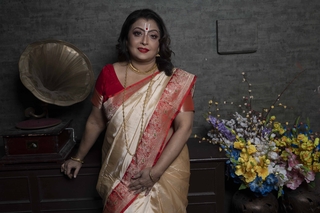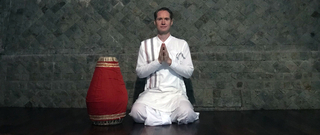
Dr. Kankana Mitra (Roy Chowdhury) holds a Ph.D. from Netaji Subhas Open University and serves as an Associate Professor of Vocal Music at Rabindra Bharati University in Kolkata, India. Specializing in Indian classical music, Rabindra Sangeet, and Kirtan, Dr. Mitra is a distinguished educator and performer with a deep commitment to preserving the rich traditions of Indian music. In addition to her academic work, she has published numerous articles on Bengali Kirtan, a traditional form of devotional music, contributing valuable research to the field.
Dr. Mitra is an accomplished performer and has recorded with the Angel Music Company and regularly conducts workshops and seminars in India and abroad. Her research explores the theoretical and historical contexts of Indian classical and devotional music, and her dedication to promoting and preserving this cultural heritage continues to influence both her students and the wider musical community.
Steve Gorn, whose Indian Bansuri flute is said to ‘re-align the cells,’ is featured on the Grammy winning recording, “Miho – Journey to the Mountain,” with the Paul Winter Consort, as well as the Academy Award winning Documentary film, “Born into Brothels.” He has performed Indian Classical Music and new American Music on the bansuri bamboo flute, soprano saxophone and clarinet in concerts and festivals throughout the world. His CD, Luminous Ragas, is a landmark recording of music for yoga and meditation. Recent recordings include Between Two Worlds and Illuminations.
For more information, view www.stevegorn.com

Born in 1977, Bhīma-Karmā Vṛkodara Sāragrāhi was raised in one of the pioneering yoga-āśrama communities of the 1970s &80s as a Vaiṣṇava brahmacārin. Since early boyhood, Mṛdaṅga has formed his spiritual connection, practice and offering. By his late teens, he began performing, recording and touring with Kṛṣṇa Dās, Śyāma Dās and Jai-Uttal, playing Mṛdaṅga for the first Grammy-nominated kīrtana album.
Desiring to delve deeply into the sacred musical culture and technical art of his beloved instrument, he left the then budding popular kīrtana music scene in 1999 and moved to India for more than 10 years of intensive study and practice. After his foundational Mṛdaṅga studies, he studied Nāṭya-Śāstra, relevant Ṛg Veda passages, the Brahmāṇḍa-cosmology of Bhāgavata Purāna etc, gaining a comprehensive understanding of Tāla and Mṛdaṅga’s full form, as a developed spiritual, mystical and musical yoga.
Bhīma-Karmā Vṛkodara Sāragrāhi began Mṛdaṅga studies in 1999 and is Dr. Hare-Krishna Halder’s śiṣya/student Manoharshaya sampradāya of Mṛdaṅga, since 2009. He received the Brahma-Sambandha initiation into the Puṣṭi Mārga Vaiṣṇava tradition of Śrī Vallabhācārya from Bava-Śrī Milan Gosvāmi in 2003. Bhima-Karma is also a trauma-therapist in the Somatic Experiencing school of Dr Peter Levine and a Hand-Analyst for more than 20 years.
